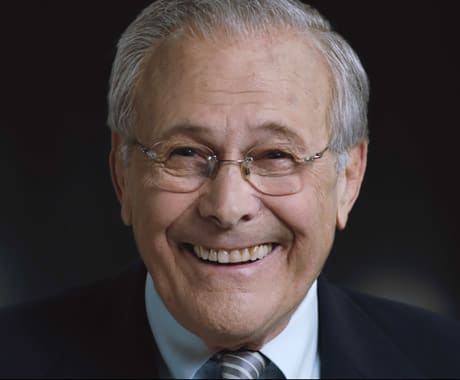In the early moments of The Unknown Known, former US Secretary of Defense Donald Rumsfeld attempts to amend director Errol Morris's impression of him as an obsessive personality to insist that his demeanor is instead typically cool and measured. He then spends the rest of the interview attempting to prove exactly that.
In an extraordinary companion piece to his 2003 documentary about Robert McNamara, The Fog of War, Morris takes on the difficult task of penetrating the thick veneer of Rumsfeld and yields results all the more intriguing for the few definitive answers he is able to pin down.
Morris is assisted in his task of piecing together the events that happened while Rumsfeld served under George W. Bush by the innumerable internal memos Rumsfeld left in his wake, often having Rumsfeld read his own "snowflakes," as they were known, into the camera. The film begins with the events surrounding 9/11 before doubling back to the years Rumsfeld spent in the Nixon and Ford administrations.
Eventually returning to the war on terrorism and the invasion of Afghanistan and Iraq, Morris is helped by Danny Elfman's hypnotic score in masterfully linking key moments in Rumsfeld's past to crucial decisions that were made in the Middle East. Special attention is paid to the miscommunication that occurred in the handling of detainees (something Morris covered in his earlier doc Standard Operating Procedure) and the hunt for Saddam Hussein.
Rumsfeld proves to be a predictably cagey interview subject for someone so hung up on semantics and the definitions of words and phrases, deftly evading and dissecting the well-researched questions from Morris.
He's hardly a wooden personality however, expressing his views on how unpredictable the decisions and responses during combat can become in a playfully contentious manner that's often laced with his dry sense of humour. There may not exactly be any bombshells, but it's still surprising to hear how Rumsfeld learned of the presidency's decision to commit to the Iraq War and that he's not above admitting that mistakes were made.
In returning over and over again to the image of a snow globe and the whirring ball of white within, Morris presents Rumsfeld as a man awash in a sea of information, to the point where he seems unable to even discern what he meant in his infamous statement that inspired the film's title.
If he ultimately isn't quite as candid and forthcoming as McNamara was in The Fog of War, we must consider that McNamara had the benefit of decades of hindsight, whereas Rumsfeld concedes himself that his work as Secretary of Defense can't be properly appraised until more of the smoke has cleared.
(eOne)In an extraordinary companion piece to his 2003 documentary about Robert McNamara, The Fog of War, Morris takes on the difficult task of penetrating the thick veneer of Rumsfeld and yields results all the more intriguing for the few definitive answers he is able to pin down.
Morris is assisted in his task of piecing together the events that happened while Rumsfeld served under George W. Bush by the innumerable internal memos Rumsfeld left in his wake, often having Rumsfeld read his own "snowflakes," as they were known, into the camera. The film begins with the events surrounding 9/11 before doubling back to the years Rumsfeld spent in the Nixon and Ford administrations.
Eventually returning to the war on terrorism and the invasion of Afghanistan and Iraq, Morris is helped by Danny Elfman's hypnotic score in masterfully linking key moments in Rumsfeld's past to crucial decisions that were made in the Middle East. Special attention is paid to the miscommunication that occurred in the handling of detainees (something Morris covered in his earlier doc Standard Operating Procedure) and the hunt for Saddam Hussein.
Rumsfeld proves to be a predictably cagey interview subject for someone so hung up on semantics and the definitions of words and phrases, deftly evading and dissecting the well-researched questions from Morris.
He's hardly a wooden personality however, expressing his views on how unpredictable the decisions and responses during combat can become in a playfully contentious manner that's often laced with his dry sense of humour. There may not exactly be any bombshells, but it's still surprising to hear how Rumsfeld learned of the presidency's decision to commit to the Iraq War and that he's not above admitting that mistakes were made.
In returning over and over again to the image of a snow globe and the whirring ball of white within, Morris presents Rumsfeld as a man awash in a sea of information, to the point where he seems unable to even discern what he meant in his infamous statement that inspired the film's title.
If he ultimately isn't quite as candid and forthcoming as McNamara was in The Fog of War, we must consider that McNamara had the benefit of decades of hindsight, whereas Rumsfeld concedes himself that his work as Secretary of Defense can't be properly appraised until more of the smoke has cleared.
